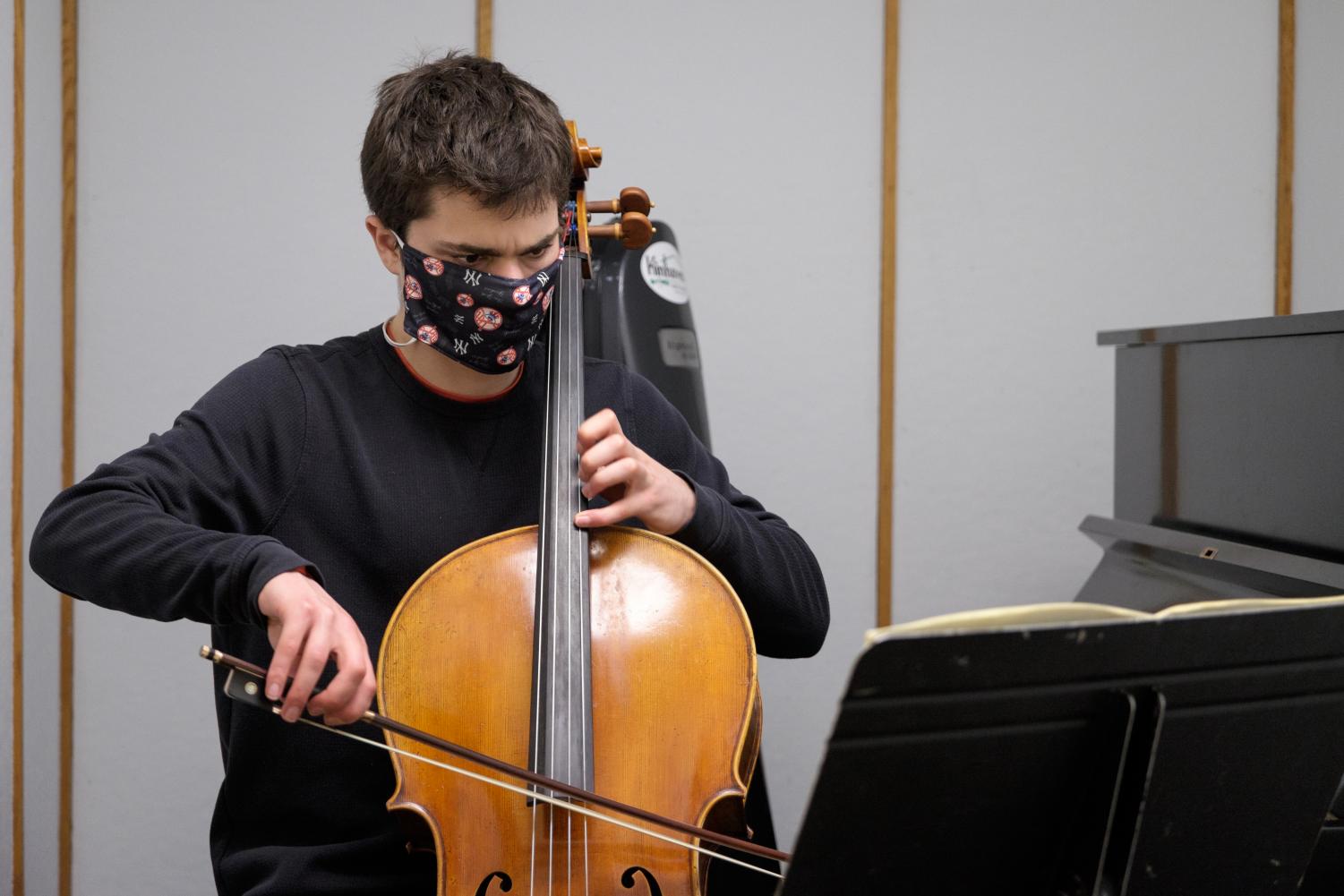What’s changed for music lessons in the time of COVID-19?
Music lessons persevere through Zoom
March 10, 2021

Few professions have been as severely affected by COVID-19 as the music industry. Live, in-person performances at Williams are all but extinct, and ensembles can no longer meet to play together. This change is very visible within the College’s music department, where music lessons and policies in Bernhard Music Building are significantly different than before. While those who play some instruments, like string instruments and piano, can practice while wearing a mask and therefore can continue in-person lessons, other musicians, like those who play woodwinds, voice, and brass, do not have such a luxury.
Artist Associate and Instructor in Trumpet Steve Felix highlighted accessibility as one of the difficulties that has come with teaching over Zoom. “The biggest initial challenge was, ‘does everyone have the means of doing lessons remotely?’” he said.
Sound quality over Zoom also made remote lessons more challenging. “When I teach in-person, the most important thing that I value is audio quality,” Felix said. “Getting access to a decent-quality microphone was huge, and for a lot of students, it’s challenging for them to be able to get that type of equipment.”
Flute student Molly Spencer ’24 said that beginning lessons at the College remotely has been difficult for her. “Switching to a new teacher is really hard, and it’s even more difficult when you can’t connect with them in person and they don’t know how you sound in real life,” she said.
Performing, too, is more of a dream than a reality for some ensembles and musicians. Spencer noted the uncertainty that surrounds any hope of performance for woodwinds, brass, and any other instruments that require unmasked playing. “A lot of it feels strange because … every goal feels focused on the hope that ‘one day’ we’ll perform,” Spencer said.
Not all musicians said they’ve experienced such drastic changes, however. Associate Artist in Voice Paul La Rosa ’02, expressed a positive attitude and comfortability with online teaching. “Normally I conduct my lesson with the majority of the time being spent with exercises, and that’s still the same,” La Rosa said.
The practice of having remote voice lessons, too, is not something new. “It’s been sort of standard for a while now, even before video [calling] has been a thing,” La Rosa explained. “I remember doing that over the phone [before COVID].
With a focus on studying exercises and with little pressure to be ready to perform, La Rosa said he feels that his students will be better prepared than ever once performances start back up again.
“It’s been beneficial to have a whole year where you don’t have to worry about getting your voice in shape for performance, you don’t have to worry about ‘Plan Bs,’” he said. “They have a whole year to build up a foundation for their technique.”
Within the building itself, day-to-day operations have changed significantly, and Stage and Orchestra manager Jeff Miller has been at the forefront of those developments. In a normal year, Miller would be stage managing and running front-of-house for events, he said. But with the Berkshire Symphony and most live performances on hold, Miller’s usual responsibilities are absent from his day-to-day. Instead, his job has been focused on “the hardware and software of recording to support lessons, ensembles, and teaching in the department.”
With almost all lessons being taught remotely, and with studio recitals and ensemble performances unable to host audiences, Miller needed to familiarize himself with new technology. “I just did a bunch of research on streaming and I was really going cold with [it],” he said. “I had to really figure that out, and it was a trial and error.”
Miller added that some of the benefits of a virtual semester might extend to students in the future. “We ordered some recording equipment that, moving forward, we hope students will use to audition for grad schools, should you want to go into music, or anything like that,” he said.
When the pandemic finally ends, Miller predicts that some of the adjustments made to many collegiate music programs, including Williams’, might just stay. “A lot of the conservatories have been streaming specific recitals and concerts, and I think that’s something we are going to have to address,” he said.
Felix said he hopes that people will remember how much they missed live music during the pandemic, and that the appreciation will be demonstrated by both musicians and the public. “Music, at its base level, is an in-person art form,” he said. “There’s not really a suitable replacement for this in-person music making.”








